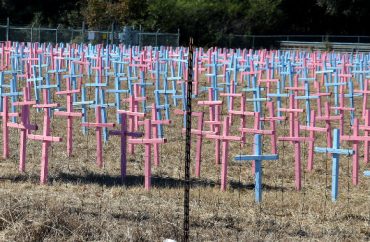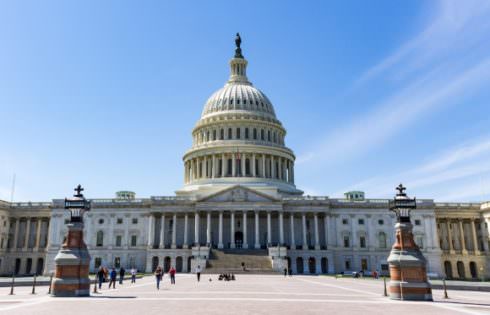
With this speech suppression, students ‘will be ill-prepared for the world after graduation’
A Christian college refused to allow a display of Christian crosses to honor “abortion victims,” saying it would be “divisive,” according to email correspondence obtained by conservative and civil liberties groups.
“I didn’t think it was really going to be a problem at all,” Emily Kokot, treasurer and secretary for Young Americans for Freedom at Rocky Mountain College, told The College Fix in a phone interview.
That’s because “for the last couple of years,” the administration has allowed the campus affiliate of the Young America’s Foundation to install “a 9/11 memorial where we put flags up on the ground on the campus outside” (below), she said.
Instead, Dean of Student Life Brad Nason told Kokot that “we draw the line at public displays of divisive topics,” in an email referenced by Young America’s Foundation and the Foundation for Individual Rights in Education. (Kokot works part-time in Nason’s office.)
Pressed as to why public displays are not allowed, Nason responded that “we have effectively eliminated every student’s ability to choose to engage or not engage with that issue” if the college allows public displays. They could also imply the endorsement of the college, he wrote.
MORE: 9/11 memorial banned from campus venue because of ‘triggering’ policy
“I think the idea that people can’t separate out actions of college students from actions of a college is naive,” Adam Goldstein, program officer in FIRE’s Individual Rights Defense Program, told The Fix in a phone interview.
“I think we all know that college students engage in activism and no one is confused that institutions are enthusiastic necessarily about every protester who shows up on campus,” he said.
FIRE launched a pressure campaign against the college last week. Its auto-generated email to President Robert Wilmouth says RMC graduates “will be ill-prepared for the world after graduation if the school continues to prohibit ‘divisive’ displays and speech.”
The cross controversy wasn’t the last time the Montana school – “historically related” to three mainline Protestant denominations – would prevent the YAF chapter from posting an abortion-related display. It also rejected an “Unborn Lives Matter” poster even though Kokot said the club followed university guidelines.
Kokot told The Fix the abortion issue isn’t even her first brush with the college on freedom of expression. She mentioned previous incidents related to pro-President Trump decorations in the dorms, a YAF display on border security, and the club’s attempts to promote an appearance by conservative pundit Katie Pavlich.
‘The pro-life/pro-choice debate is incredibly divisive’
The chain of events began in August, when Kokot emailed Nason to get approval for the cross display as part of YAF’s “pro-life week” (below).
Nason shot her down, distinguishing between “discourse and dialogue” about the pro-life movement and public displays with pro-life themes. “You and the YAF group are welcome to table around the issues, engage students in discussions, provide guest lecturers, films, programs, etc., but we cannot approve this specific request,” he wrote in an email.
The administration doesn’t show favoritism toward some groups, the dean continued, noting President Wilmouth’s cabinet had recently denied an “unnecessarily and inappropriately confrontational” display by a liberal group.
That proposed on-campus marketing campaign “would have included what most would interpret as liberal messaging, around the topics of immigrant rights, climate change, science, and racism,” he wrote.
Frustrated by what she perceived as a defense of speech suppression, Kokot follow up with him via email: “What is the difference between spreading our message by word and having a display?” She pointed to the Student Code of Conduct, emphasizing that it “encourages students to consider and seek to understand different ideas and points of view.”
MORE: Pro-life students win speech concessions in settlement with university
He didn’t back down. “The pro-life/pro-choice debate is incredibly divisive” and “a public display is confrontational,” Nason responded via email. It would also imply the “direct or tacit endorsement of that particular issue by the College.”
The administration has “a responsibility to create a safe, comfortable and respectful environment where students live and learn,” the dean concluded. Nason gave the same message when Rayna Laakso, president of the YAF chapter, went to visit him with Kokot on Sept. 16.
The following week, Kokot brought the dean “a couple posters,” she told The Fix. “One of them had statistics about abortion, which he allowed to be put up.” But Nason rejected a poster that read “Unborn Lives Matter” (below), even though it included the club’s name and meeting time, as required for posters. (Such identifiers give students the option to engage with the club on that particular issue, Kokot said she was told.)
Nason told Kokot that he prohibited liberal groups from also putting up posters with similar messaging, she said: “At that point, it was pretty clear that our group, and other groups, were being restricted.”
The dean’s directions are “very unclear, very subjective, and it’s just basically whatever he wants or doesn’t want up, whatever he thinks is controversial or not controversial,” Kokot told The Fix.
Neither Nason nor the college’s communications department responded to multiple requests for comment from The Fix.
MORE: College requires prior review of pro-life group’s social media

‘Confrontations with ankle-high inanimate lawn decorations tend to be easily resolved’
FIRE demanded an explanation for the college’s treatment of both YAF and other student clubs in a Nov. 4 letter to President Wilmouth.
Written by Goldstein, the letter reads that “an institution that makes affirmative promises to grant freedom of expression to its students is morally and legally obligated to keep those promises, and can be contractually held to the commitments it makes.”
The letter makes multiple references to the college’s Student Code of Conduct. It affirms that “Rocky Mountain College is a community of scholars in which the ideals of freedom of inquiry, freedom of thought, freedom of expression, and freedom of the individual are sustained.”
Kokot also highlighted the contrast between the code and the administration’s actions. “It doesn’t make sense to be restricting us in these sorts of ways when the Student Code of Conduct says that we’re as students supposed to be able to learn different points of view and whatnot,” she told The Fix.
While Nason’s email to Kokot indicated an eagerness to avoid divisive topics, Goldstein pointed out:
Noncontroversial speech has no opponents and requires no protection. Any promise of freedom of expression inherently presupposes that the speech in question would be, in someone’s estimation, divisive or offensive.
MORE: Public university drops ‘annoyance’ policy to settle pro-life suit
By declaring the display of crosses “confrontational,” Nason is rationalizing the heckler’s veto, Goldstein continued. It’s not even an “accurate” description of the display: “Generally speaking, confrontations with ankle-high inanimate lawn decorations tend to be brief, one-sided, and easily resolved.”
Though the college is private, the concept of free speech is “older and broader than the concept of the First Amendment … free speech in a free society of academic freedom, academic inquiry, these are ideas that are much broader than that,” Goldstein told The Fix:
(block) So it’s not merely enough to say, well, as a private entity, they’re not subject to the First Amendment. Maybe not, but they didn’t promise the First Amendment, they promised freedom of speech, and that’s a cultural value that’s deeper with much broader implications and obligations than the First Amendment. (block)
Rocky Mountain College is “bound to do the things it says it’s going to do,” he said. “And those promises are contractually enforceable in court.”
‘He didn’t want to contradict himself’ so he censored both groups
Kokot related her other brushes with the administration to The Fix, going back to the spring. All involved seemingly arbitrary decisions by administrators on speech-related issues.
Resident advisors told some students this summer to take down their “Trump flags” because they could be considered offensive. She then consulted the Residence Hall Handbook, which prohibits decorations on doors and windows, yet it’s not applied evenly: “RA’s can put decorations and stuff on your doors and they allow other students to put up certain decorations, so it’s kind of wishy washy.”
In contrast, nothing happened last year when her roommate “put a bunch of memes on our door,” according to Kokot.
Last spring YAF planned to build a wooden display on campus grounds in line with a Young America’s Foundation suggestion for chapters to “engage on the issue of border security,” she said.
As with the intended Unborn Lives Matter poster this fall, “it wasn’t really going to be an issue as long as we labeled that it was our club doing it,” Kokot said. She went to Nason for permission for the display, and he redirected her to the facilities director.
“He was actually very supportive of the idea and even offered to help us transport materials and stuff if we needed,” Kokot said of the facilities director.
When she went back to work the next day, Nason told her “he had talked to the board members and they decided that it wasn’t something that they wanted on campus, so our approval was revoked”:
He said that part of that reasoning was because he had also told a group that they couldn’t put up a display that basically promoted the opposite of what we were promoting, and he didn’t want to contradict himself.
MORE: Public university threatens student for pro-Trump sign in his window
Also last spring, YAF tried to get the college’s marketing department to send a press release for its event with Pavlich, the conservative pundit, because “I know they do them for clubs and certain events.”
After she submitted a formal request, the department told Kokot the college only does press releases for events that will get a lot of media attention. She was also encouraged to combine her efforts with other departments on campus:
But the funny thing was that I was asking other students and other club leaders about it, and the president of the environmental club told me that they have done press releases before and they didn’t have to do anything with another department, so that was kind of odd.
The confusion continued when Nason set up another meeting for her with the marketing department, according to Kokot. The department told her “they didn’t want to put anything out that wasn’t going to be published, and they wanted us to get support from another department on campus.”
The debacle was so close to the Pavlich event that the club ended up doing its own advertising, she said. “It shouldn’t have been an issue” because Pavlich is “really well known” and “it’s Billings, Montana. Whenever there is an event, I don’t know, it’s usually advertised quite a bit.”
MORE: Student pro-life display casually vandalized in broad daylight
IMAGE: Richard Elzey/Flickr
Like The College Fix on Facebook / Follow us on Twitter






Please join the conversation about our stories on Facebook, Twitter, Instagram, Reddit, MeWe, Rumble, Gab, Minds and Gettr.